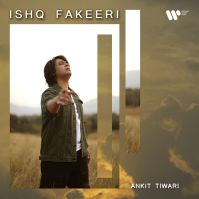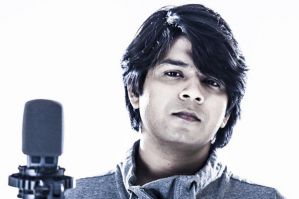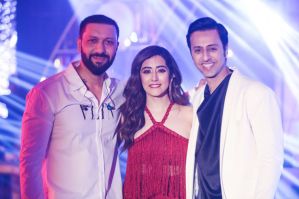Manoj Muntashir: 'Galliyan' was a hit as it could connect with the audiences

Manoj Shukla aka Manoj Muntashir, the lyric writer of the track ‘Galliyan’ from the film ‘Ek Villain’ started his journey as a script writer on television, and has since come a long way. In an interview with Radioandmusic.com’s Dhairya Ingle, Muntashir talks about his journey, upcoming projects and his inspiration.
First of all tell us your real name since Manoj Muntashir happens to be your pen name.
My parents named me Manoj Shukla. As I developed keen interest in shayri, I followed the tradition of adopting a pen name. So I chose Muntashir as my pen name since it is unique and no other poet in my knowledge ever had it.
How would you describe your journey as a writer and now a lyricist?
The journey has been truly adventurous. The best thing about being a writer is that there is nothing like a bad experience. Any and every moment of life, be it good or bad, is a learning experience which could form the raw material for great creative work. I came to Mumbai in 1999, with 700 Rupees in my pocket. I was dwelling on pavements and feeding myself at the mercy of friends and well-wishers. Many times I even went without proper food. But overnight I was blessed with an angel called Amitabh Bachhan. He chose me to write KBC and within weeks, I was driving my own car and living in a comfortable house. So, the journey so far has been nothing less than a dream come true.
Tell us more about your childhood fascination with poetries or shayris
I am an only child, so right from the beginning, I had everything but company. We were a family of three, and both my parents were working, so most of the time I was left alone. Even my house was situated in a distant corner of Amethi, and practically had no neighborhood while growing up. As there was no TV during those days, I used to have books for entertainment when I came home from school. I grew up on stories, novels, comics and finally poetries. During the fourth standard, my father took me to a ‘Kavi-Sammelan’ in my town. That was probably my first brush with poetry. I was quite fascinated by poets reading their lines and people going crazy. That was the first seed of literature sown in my heart.
What inspired you to become a writer then?
I started writing when I was barely 10 years and eventually decided to take it up as my profession when I accidentally got introduced to Sahir Ludhiyanvi’s work. I still remember I was on my way to college in Allahabad from Amethi. On the way, the train I was travelling in stopped at the station Pratapgarh for quite a while due to some technical problems. So I decided to take a stroll down the platform and spotted a book-stall in one corner. I randomly picked up a collection of Sahir’s poetries. By the time technical issues were cleared and my train reached Allahabad, I had decided, I am going to Mumbai, and I will write lyrics for films.
How did you cope with the timeframe post ‘Do Duni Char’ as you were not getting enough work in Bollywood. What kept you going?
‘Do Dooni Char’ was heavily appreciated. Despite being a small film, it did great business and ended up winning several awards including Filmfare and national awards for Best Film. I had written all the songs for the film, but to my surprise no one took notice of my work. The very idea behind ‘Do Dooni Char’s’ music, was to support the narrative instead of making sellable music. So for the film, the music worked quite well, but my music directors- the Meet Bros, Anjjan, Ankit Tiwari and I, remained unnoticed. It was a blow to me, but I knew good days were just around the corner. Thus for encouraging myself I wrote these lines:
“Maine Lahoo Ke Katre Mitti Me Boye Hain, Khushbu Jahan Bhi Hai, Wo Meri Karzdaar Hai… Ae Waqt Hoga Ik Din Tera Mera Hisaab, Meri Jeet Jaane Kab Se Tujhpe Udhaar Hai”
These days there are many lyricists/composers who use inappropriate words in the song; do you think it is essential to use crass lyrics?
Of course not. It is just individual choice. Off late I have come across many such instances when I was asked for such lyrics and I humbly turned down the films. But I can afford to do that because I have a prosperous career in television, whereas many of my fellow lyricists may have to bow down to such demands as they need to earn their bread and butter at any cost.
What are the qualities that one must possess to become a good lyricist?
In-depth understanding of words and the ability to express the most complex emotions in the simplest language are key qualities. That is why I always say, literary writing is way easier as compared to writing for cinema. There you are writing for a certain class and strata of readers, whereas cinema caters to a diverse range of audience. A song like ‘Galliyan’ becomes an instant hit only because everyone from a ricksha-wala to a corporate CEO can relate to the words and emotions.
Which one do you enjoy the most, writing for reality shows or being a lyricist?
Without the slightest shadow of doubt, I love writing lyrics. But at the same time, I am eternally grateful to television for supporting my dignity and pride. If I can choose my work in cinema today, it is only because television has given me a stable foothold.
Tell us about your future projects apart from ‘Welcome Back’?
My next release will be ‘Rang-Rasiya’ by Ketan Mehta. Post that there are a whole lot of films like, ‘Welcome Back’, ‘Do’, starring Amitabh Bachhan and Farhan Akhtar, Neeraj Pandey’s ‘Baby’ starring Akshay Kumar, ‘Mastizade’, ‘Leela’, ‘Mr. X’ starring Emran Hashmi and couple of other films.














